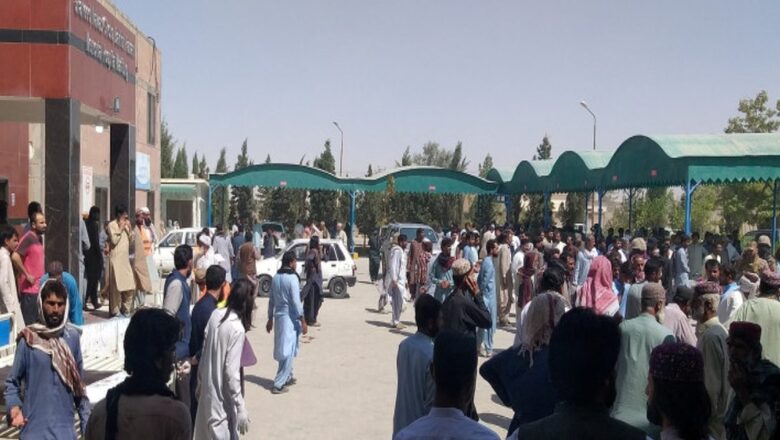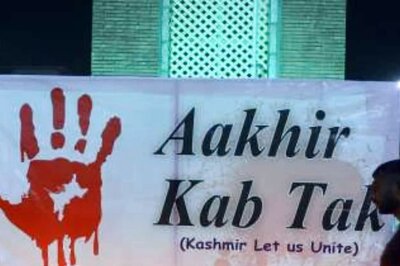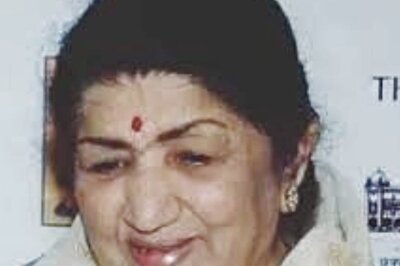
views
After days of media headlines gleefully following the India-Canada spat on a daily basis, calling out India and its ‘machinations’ in Pakistan, its Interior Minister seems to have decided to take a larger step further. He alleged that two deadly suicide bombings recently are the handiwork of the Research and Analysis Wing (R&AW). Such a statement would be hilarious at one level, given that Pakistan has antagonised everyone on all its borders and has no lack of enemies, including within its own soil. But the tragedy to the people is intense. More than 60 lie dead, and that too in towns that have already suffered from Pakistan Army’s counter-terrorism campaigns and its accompanying ‘enforced disappearances’.
The twin bombings
The twin suicide bombings came as the latest terror incidents as the country reels from a rising wave of terrorism over the last year. One bomber targeted an Eid Milad un Nabi procession in Mastung, Balochistan, causing some 55 casualties and the other in Khyber Pakhtunkhwa’s Hangu also targeted a mosque, leaving five dead and 12 injured. Reportedly, the Tehrik-e-Taliban Pakistan (TTP), who are the usual suspects in these cases, have (or so it is said) denied their hand in the attack, which apparently leaves the field open to accusing a neighbour. Justin Trudeau at least waited three months before making his charge. Pakistan couldn’t wait three days. That any intelligence agency or police procedure could prove such a claim in just 24 hours is unimaginable, even given that Pakistan does have an intelligence agency that virtually runs the state on behalf of the army. If it had prior intelligence on India fomenting an attack, the question arises as to why it did nothing to prevent it.
Some interesting statistics
At the briefing for the press, the minister also let it be known that security forces managed to secure the release of four footballers out of six who were abducted in Dera Bugti in early September. In the same month, officials managed to arrest 60 Afghans for drug trafficking, with the country’s premier Anti-Narcotics Force arresting 1,652 narcotics smugglers over the year and recovering some 157 tonnes of narcotics. Here’s another statistic: Pakistan recorded the second-largest increase in terrorism-related deaths worldwide in 2022, a 120 per cent rise from the 292 deaths the previous year. Pakistan overtook Afghanistan as the country with the most terrorist attacks and deaths in South Asia, a position held by the latter since 2017, according to a report by the Australia-based Institute for Economics and Peace (IEP).
Out of the ‘top 20’ terrorist groups, seven are in Pakistan. The Baluchistan Liberation Army (BLA) was responsible for 36 per cent or a third of terror-related deaths in Pakistan, a ninefold increase from the year prior, making it ‘the fastest-growing terrorist group in the world.’ The GTI noted that the BLA had overtaken the TTP as the deadliest terrorist group in the country. Criminals of all kinds thrive here, moving in and out of the country through some 200-plus passes. And here’s a closing statistic: According to another report, the number of ‘forcibly disappeared’ in Balochistan last year was 629, extrajudicially killed 195 and tortured 187. If you multiply all those by their numbers of friends and relatives who suffered (even at a low figure of six per person), you’ll get a figure of some 40,000 people who hated the Pakistani forces. This is just Balochistan.
Add Hangu in KP, the other site of a bombing, where 3,380 have been reported missing and thousands displaced due to aerial bombing, and the numbers start to stack up. And this is just within Pakistan. Consider the thousands upon thousands who have been hurt and maimed by Pakistani operations in Afghanistan over 30 years. Pakistanis are (justly) agonized by the bombing of an army school in Peshawar (2014). Few know that a terrorist attack on a school in Kabul took place just a week earlier, and another in Paktia. Yet Pakistanis still think India had something to do with that heinous attack.
Incensed neighbours and annoyed ‘friends’
Apart from that, there are those outside the borders who have little reason to like Pakistan at all. The Americans will never forgive or forget that some of the most serious attacks against their men – particularly the Camp Chapman attack of 2009 – where some of the most senior CIA agents were killed by an Al Qaeda terrorist whom the agencies had courted to infiltrate Bin Laden and Zawahiri’s inner circles. Bin Laden was killed in Pakistan, and Zawahiri died 19 years later. The CIA vowed vengeance for that and for other deaths in decades of betrayal. Others who died included a cousin of Jordan’s King Abdullah, Captain Zeid, who ran the operation. The King and Queen were both in attendance at his funeral. There are hundreds of other stories of betrayal in Afghanistan and elsewhere.
The UK has suffered a series of attacks arising directly or indirectly from Pakistan, as has France, The Hague, and Spain. Then there’s Iran, which has not only had its officers targeted by terrorist groups in Pakistan but also considers Pakistan a ‘remote base’ for US spying on Iran. Then there’s Russia, which has long considered the Islamic State a front, run by the US and Pakistan together. Then there’s the Taliban themselves, who have had to live off Pakistan’s brutal hospitality for years. Within that, the TTP has been brutalized in Pakistan’s counter-terrorism environment. Things have come to such a pass that not a week goes by without the media wondering whether war is likely to break out between Pakistan and Afghanistan.
In short, Pakistan has no shortage of enemies either within or outside the country. In fact, many would argue that the hatred of the ‘Punjabi’ army is strongest inside the country and may erupt soon into outright rebellion. Even as the Balochistan provincial government announces an ‘all-out war’ against terrorism, political tensions climb. Add Imran Khan’s supporters to those who take to the streets, even as Pakistan Occupied Kashmir erupts in protests against escalating prices and an economic slide, the likes of which the country has never seen before in its turbulent history.
It is against these realities that the interior minister blames India for the attack. Meanwhile, investigative agencies have already made their initial findings that the Hangu attack seems to be by the Islamic State in Khorasan. Someone, perhaps its iron brother China – whose nationals have also been killed on several occasions in Pakistan – should present Islamabad with a mirror large enough for it to take stock of its own actions and their inevitable consequences. A period of quiet reflection may be beneficial for their collective health.
The writer is a Distinguished Fellow at the Institute of Peace and Conflict Studies, New Delhi. She tweets @kartha_tara. Views expressed in the above piece are personal and solely that of the author. They do not necessarily reflect News18’s views.




















Comments
0 comment